Table of Contents
Introduction
Professional success is one of the strongest aspiration nearly everyone has who is working for any organization. A large proportion of our daily life gets spent towards our profession. Hence its logical that our happiness is intricately linked with how happy we are at our workplace. A lot has been written about how to succeed as a professional. There are thousands of best-selling books and hundreds of courses on this topic.
But, interestingly, reading or mastering all these books and courses cannot guarantee success in professional life. It’s easy to find a large set of talented and highly skilled professionals with top class credentials struggling for growth and a similar large set of seemingly unremarkable individuals enjoying the top positions.
This article is an attempt to explore the science that governs success. I have to clarify here that I am no “Guru” and I have no magical formula to preach that will assure success in professional life. Like others, I too read several books on leadership and managerial efficiency. I too attended several professional courses on these topics. But, like everyone else, I had my own share of failures and successes- former being more than latter. My aim of writing this article is to question some of basic assumptions that we all carry while preparing for our professional journey, and develop a scientific framework that can guide the reader to chart his/her professional life.
Know What You Love And Embrace It
One of the biggest myths I keep hearing from people around me constantly is that “one must never be in his/her comfort zone if one wants to succeed. Many people end up generating significant stress in their due to such philosophies. Many fail, and start doubting their abilities. The whole crusade against comfort zone started in late 20th century and was further emphasized when Ryan and Markova proposed their famous “Comfort- Stretch- Panic” model in 2006.
The model, in short, says that for someone to grow it’s important to move away from “comfort” zone to “stretch” zone while cautioning that one must stay away from “stress zone”. When one casually reads about this theory, one might easily assume that comfort zone is linked with sub- par performance and no learning.
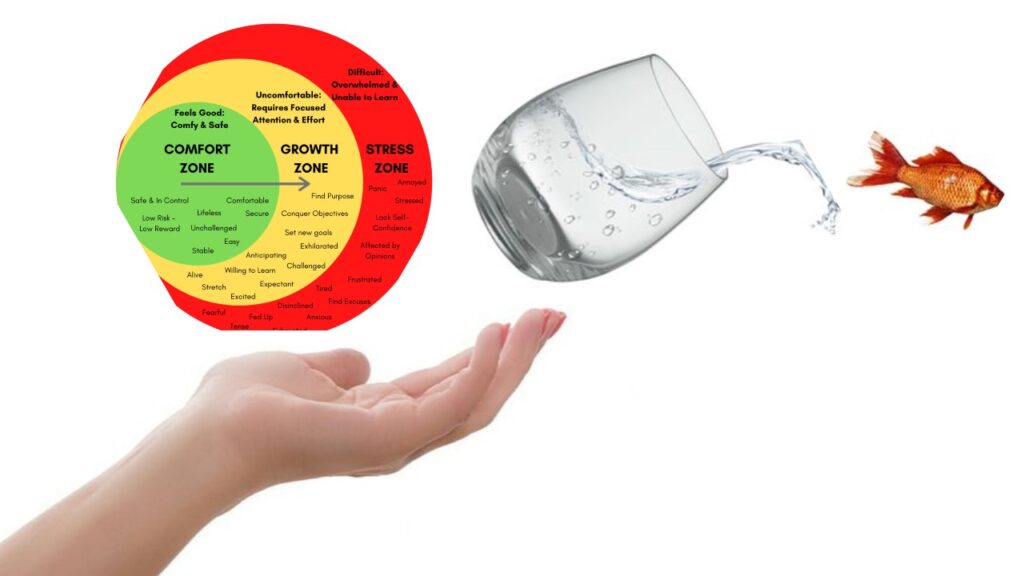
But I really think this interpretation might be incorrect. I think, the term “comfort zone” (as per Ryan and Markova model) refers to the state of routine actions that you do every day without much thought. I won’t call this as comfort zone if I don’t love doing it. For example, I won’t call cooking as your comfort zone if you hate cooking, although you must be spending considerable amount of your time cooking your meals every day. This is because, if you hate cooking and you are doing it just because you have to, you won’t try anything innovative. You won’t try challenging your skills.
But, on the other hand, if you love cooking and that is where you spend a considerable amount of time daily, no one needs to motivate you to learn more about cooking and experimenting. You will do these automatically. Experimenting and learning from those experiments are mandatory steps towards any learning and growth.
In the name of forgoing comfort zone, many people end up doing things they really don’t love. This is actually dragging yourself towards the “stress zone”. If you don’t like something, eventually you will stop putting efforts to excel in the same; and even if you are persistent and disciplined you won’t reach the heights to success you might have wished for when you started.
If you are a doctor who is deep love with human biology, in the name of moving away from comfort zone, please do not start training yourself to be an accountant. Do not aspire to become CFO at PepsiCo if you have no heart in the matters of corporate finance. But, if you were always good with numbers and you love surrounded with calculations and spreadsheets and not with medical jargons, then you will be better off trying to be a CFO!
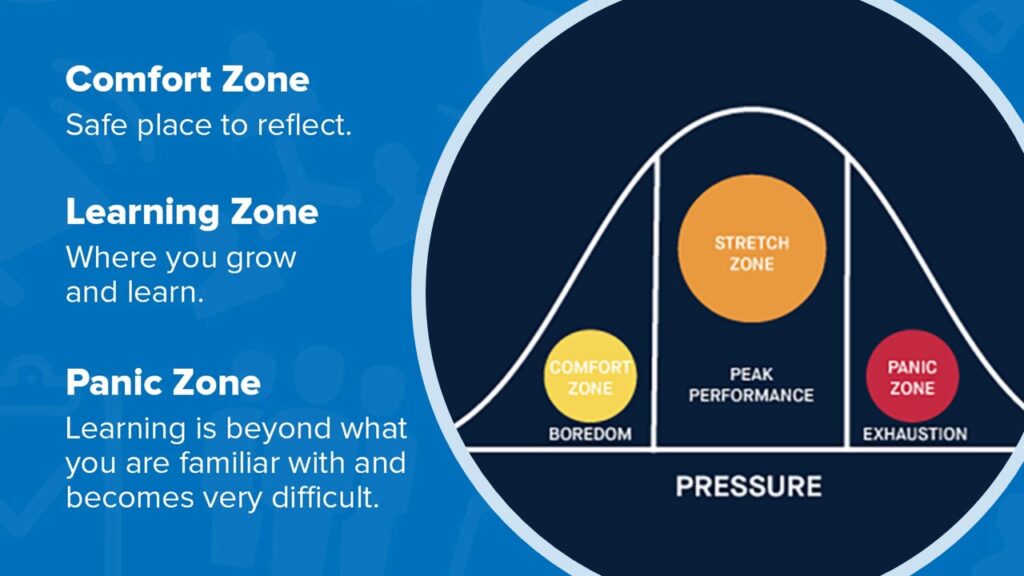
Th bottom line is- try doing something you love doing. Soon you will start experimenting and becoming better. You will be happy and you will excel. Knowing what you’re good at and doing even more of it creates excellence.
A very important and confusing question is- how to find out what you love doing? Many argue- if you haven’t even tried something, how will you even know if you would like it or hate it? Fact is that success and love often complement each other. We generally love what we are good at. If you look back into your life and have seen yourself doing something again and again successfully and that has given you happiness, try constructing your future around professions that require similar skills/activities. If you are too young, then try things you think you love until you end up discovering that sweet spot where your job involves what you love doing.
This concept reflects what is popularly known as IKIGAI. The original IKIGAI concept is about embracing a profession that involves following four characteristics:
- It is something that you love
- It is something you are good at
- It generates income
- It can make a difference to the world in some way
The journey towards success starts with finding your IKIGAI. But, it might be impossible for all to find that perfect IKIGAI immediately and make that shift. A more practical approach is to understand your strengths and passions, and try marry those to your job, while trying to move towards your IKIGAI.
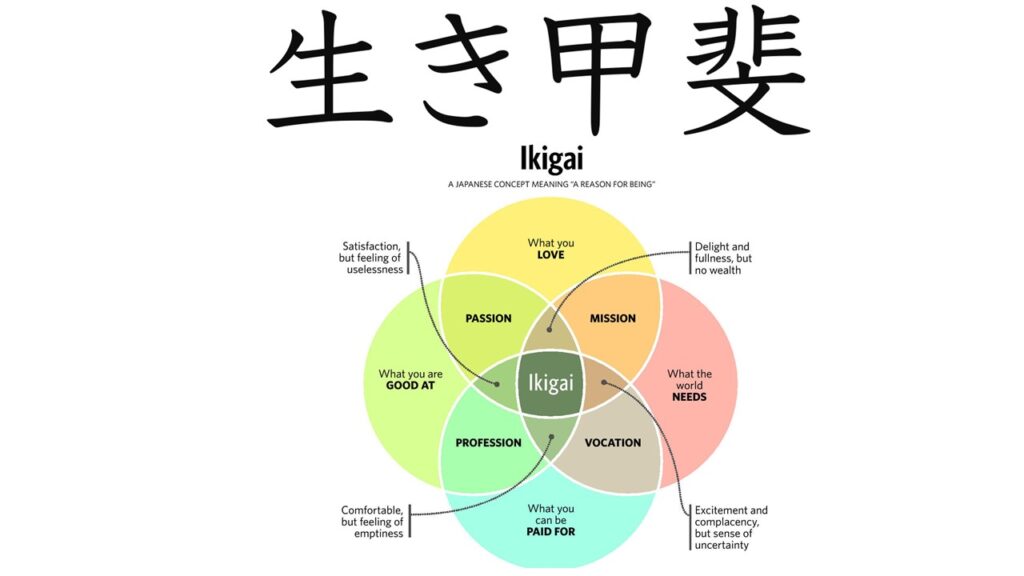
Set a goal even if you don’t have one
Once you are a little aware of what you love doing and what your IKIGAI might look like, set a goal. You might not even be sure if that’s really your goal. But, that’s okay. At the start of the journey to the top of a mountain, the summit might not be visible- it might be covered with clouds. But, still you need to imagine that summit and that paths that lead to that summit. And then choose one path. You may shift the paths as the journey continues, and as the summit becomes more visible. You may even choose to change the summit you initially targeted.
But you really must have a goal to start with, and a plan to achieve that goal.
For me, I am madly in love with human biology. I love reading. I love exploring scientific topics. I love writing. And, I am a medical doctor. So, a goal that I can set for myself may look like “I will write and publish a novel in the space of medical science fiction by Dec 2024, and will become a novelist.”. It might look absurd and foolish initially, and it’s completely fine. But once you have a goal, you have a direction. You can and must now plan your journey with great details. You should define a timeframe, key milestones with dates that must be achieved before you can reach your defined goal. Then you should do a quick gap analysis to understand what skills you lack and how do you acquire them.
As you start your journey and continue navigating towards your goal, you might end up acquiring new skills- sometimes these learnings and skills might end up altering your goal itself. For example, during my journey towards becoming a science fiction author, I might acquire skills and connections that lead me to a job role in the space of scientific writing for a reputed journal. And then I start loving my job. I can then choose to alter my goal to now become Director of Scientific Writing for, maybe, Google Health. There is nothing right or wrong, so long as you are doing what you love.
One of biggest challenges at the start when you envisage your goal is that it might look impossible. But, do remember- no goal is unachievable. Any journey, irrespective how distant the destination might be, begins with simple small humble steps- small, but persistent. The approach that works is to break the final goal into a series of several small sub-goals arranged sequentially. Then give each sub- goal a deadline. And then keep measuring your progress till you reach first sub-goal.
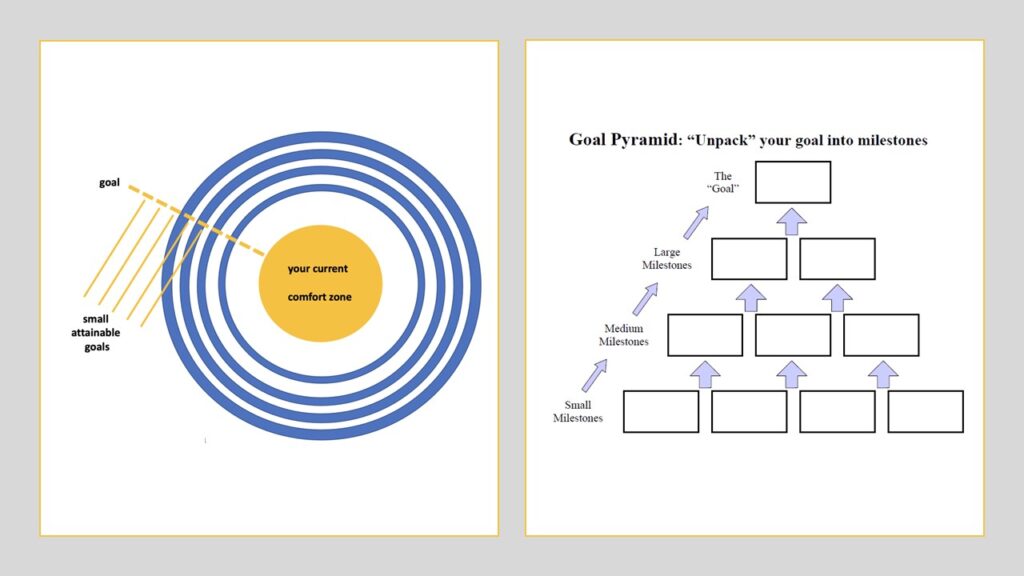
Remember to ensure that every sub-goal you intend aim to achieve must one very important characteristic- it look feasible and easily achievable. If not, break that sub-goal into smaller achievable milestones. When you keep achieving one milestone after another, soon you will start hitting your sub- goals. Eventually you will find that the original goal that looked so difficult and impossible is now very much within your reach!
Get a Mentor
This is one of the most impactful and critical of all steps towards professional success. You can seldom succeed without a mentor to coach you. A mentor will transform your life by helping you understand your biases and blind-spots. And this, though extremely critical for your success, is something you cannot do on your own. Only a good mentor can help you there.
A good mentor is some-one who is
- highly experienced and successful in your field
- has very limited or no influence on your personal or professional life
- is passionate about mentoring
Those Biases and Blind- spots That Keep us Away from Success
Few years back I read a book called “Thinking Fast and Slow” by Daniel Kahneman. I really think that book changed my life completely. And I would recommend everyone to read that book. It’s a difficult read- but the insights are worth the entire effort.
We need to understand that each one of us is biased. These biases are generated by our brains as a part of evolutionary necessity. With fairly limited information, we are able to instantly take decisions which are often accurate. We see an unshaved burly old man with dirty uncombed hair in our office and we immediately judge that this person may be someone who would be cleaning the toilets. We see someone in our office with thick glasses, elegant suits and well-polished boots and we immediately conclude that this person might be a well placed executive.
Imagine a scenario where you are sitting in this office and your CEO has given you 2 minutes to select a buddy who will help you in your job. Will you select that unshaved burly old man, or that impeccably dressed up gentleman?
Basically, we all are constantly judging each and everyone around us. Of course these judgements keep changing as more information keeps pouring. After working closely with that impressively dressed person whom you initially judged as someone extremely professional, you might revise your judgement later and brand that person as highly ignorant and inefficient. Maybe later you come to know that the unattractive shabbily looking old man is a highly cited researcher. Here, your initial “instinctive judgements” would have led to inaccurate decisions.
Our biases rule our decision making in almost all aspects of both professional and personal life. And most of the time, we might not be even aware of their existence. Such biases lead to functional blind-spots that swerve us away from reality. Consequently, they lead to errors in the decisions and choices we make in our lives. In professional world, these blind-spots are almost always killers of success and growth.
So, how to we fight against these inevitable biases. First step is to know and accept that our decisions are biased, and that we may be blind to those biases. But do note that awareness itself might not be enough. It’s easier for our minds to confirm our biases driven initial judgements rather than rejecting, by making us evaluate results of our decisions through our own biased lens. And this serves as a self- fulfilling prophecy, making us repeat our errors again and again and creating a false sense of confidence that our judgements have been correct. But still, being aware that we are biased is definitely a positive first step.
The second step is the real game- changer. We must learn to trust our instincts and biases only in scenarios which meet following two criteria:
- The scenario is an area in which you have worked for long and have demonstrated success
- The impact of the scenario is towards a short time frame.
For any scenario not meeting both the criteria, do not trust your judgement. Either think deeply, research and learn before making any decision, or seek help of experts.
(In complex chess positions, a beginner level chess player will have to think for several minutes before making a reasonable move. But a chess grandmaster will instinctively play the right move within seconds, without really thinking. A beginner, on the other hand, will almost always make all incorrect moves if he/she tries to mimic the pace of grandmaster. In short, a beginner in chess should not trust his/her instincts.
Going by the same rules, you may choose to believe instincts of a experienced and successful stock market trader for making decisions on day- trading. But you must never believe those instincts towards making long term investment spanning for more than 6 months. Experienced traders do no better job than monkeys in designing long term investment portfolios.)
A good mentor will allow illuminate your blind-spots while you make decisions. Once you are aware of these blind-spots, you will change the way you make decisions. And even there you have a feedback mechanism through your mentor to check if you are dealing with your biases and blind-spots correctly. This makes goal setting and charting a plan towards achieving your goals extremely efficient and impactful.
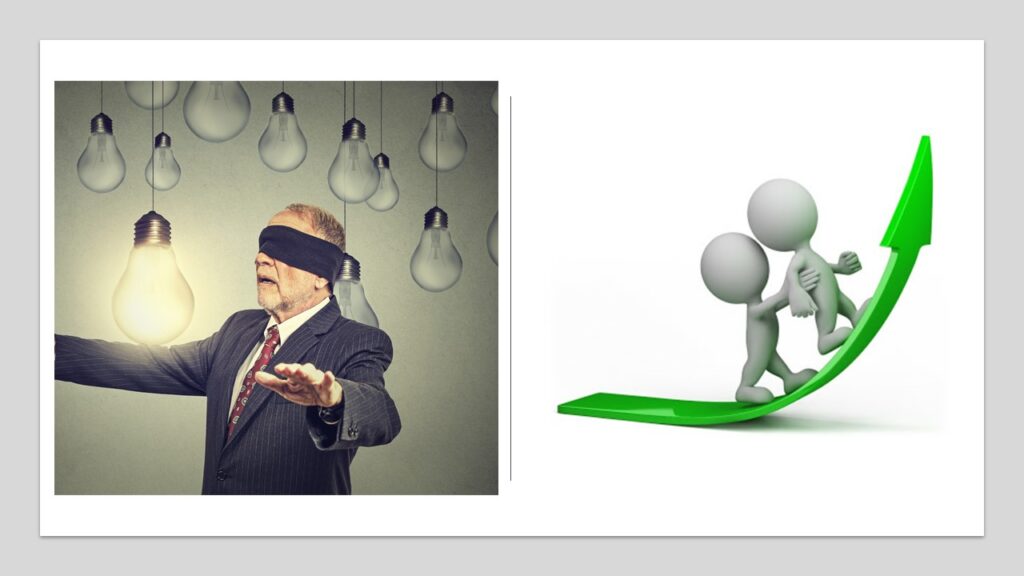
My experience with Mentorship
If you are lucky enough to find the right mentor for you, you will leapfrog significantly in your professional journey. I have been one of those super lucky individuals. In my small insignificant professional journey, I have been extremely blessed to find right mentors at the right time.
When I was in Bristol Myers Squibb, Dr Anup Uboweja was my mentor. It was his mentorship that allowed me to realize that I had not explored my potential enough and hadn’t invested on myself for growth. That insight led me to prepare for GMAT, achieve a score of 710 and eventually make it to the prestigious Indian School of Business (ISB) for a full time MBA. At ISB, I found another mentor- Chandan Mendiratta. His mentorship and guidance allowed me to navigate my fears and have a deeper understanding of my biases that were impacting both my personal and professional life. He still continues to be my “philosophical” mentor.
But none of these mentors were purposefully designated mentors. I was just lucky that they ended up mentoring me.
I have been working with Takeda since 2018. I had been successfully implementing impactful projects in India. I was leading a team that I enjoyed working with, and my team members enjoyed working with me as their manager. I was genuinely committed towards their professional development and growth, and that intention led to a strong bonding between us. My team was one of the best performing ones, and I was always proud of my team. But somehow, despite all project successes and managerial acumen, I was finding stagnancy in my professional growth. I wanted to take up larger responsibilities spanning beyond the country role that I was in. I found several of my colleagues getting promoted to such roles, while I kept hitting some form of barrier that I wasn’t able to comprehend.
In 2020, I came across an intra- company program by Takeda called “R&D Mentoring Program”. Without much insight or thought, I enrolled myself as a mentee. Hardly I knew at that point of time- this program will significantly impact my professional journey.
The mentor who got assigned to guide me was Dr Hrvojka Kostelac. Hrvojka was a medical affairs professional with >20 years’ experience. Like me, by qualification, she was an MD with license to practice medicine. She headed Medical Affairs and RA for MCO EE region of Europe. Her experience with handling teams and managing complex matrix project was exemplary.
Hrvojka exactly matched all the criteria, which I now identify, for a perfect mentor for me.
- She was highly experienced and successful in my field
- She had no relationship with me in terms of personal or professional influence
- She was passionate about mentoring
We used to meet virtually over Microsoft Teams for an hour every alternate week. She started by asking me to define my goals, and enlist my strengths and areas of improvement. And in each meeting I would describe a professional challenge I was facing and explain how I was dealing with the same. The conversations were so rich that I soon realized how blind I was about myself. One of the biggest gaps I uncovered about myself was my inability to efficiently influence those who were not directly part of my team. One blind-spot that I was not aware of about myself was the fact that I wanted everything organized and planned, and I would try to be away from chaos. I would spend lot of time and effort trying to weave everything and everyone under some form of plan. Under her guidance I learnt to accept that things and people might not follow a prescribed plan. I slowly learnt to embrace chaotic situations and unplanned decisions, and how to alter plans according to situation.
There were several other blind-spots around me that I was unaware of, and Hrvojka systematically allowed me to build a sense of awareness about those, while slowly leading me towards my envisaged goals. By the end of this mentorship program, I realized there were multiple small changes in the way I was handling projects and people around me. And the truth is, big things are easily visible and can be acted upon by anyone. But, the real magic happens when you identify those small subtle things and start working on them. Truly, small is BIG!
A year later, I got promoted to global medical affairs and I made that big move of shifting from India to US. And this move wouldn’t have been possible without Hrvojka’s mentorship. That’s the difference a good mentor can bring!
In 2022, I again applied for Takeda’s “R&D Mentoring Program” to seek further mentorship. My official mentor now is Narmada Rosner who leads Global Medical Communication at Takeda. Interactions with Narmada has also been extremely helpful, and allows me to get a different perspective on the topics I used to discuss with Hrvojka.
Hrvojka still continues mentoring me. I still keep pestering her one hour every month and she graciously keeps mentoring me. Not everyone is as lucky as I am to find such a superb mentor!
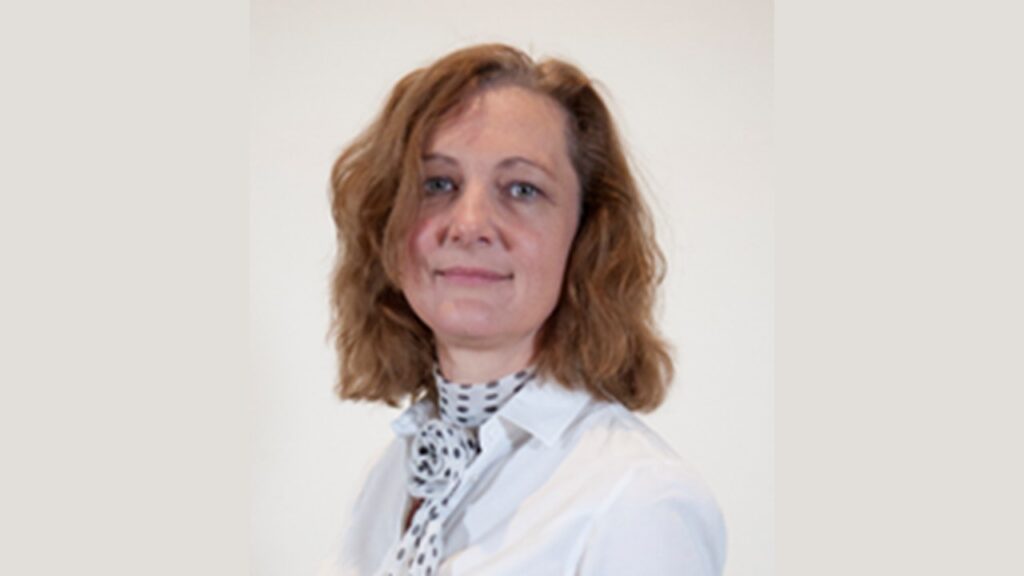
Keep Learning and Experimenting
During the process of goal setting, you would identify skills that you must acquire for excelling in the journey you have embarked upon. It’s highly critical to define how you are going to acquire those skills. Maybe you would want to join a formal training for the same. Maybe you would want to learn the same through YouTube. It really doesn’t matter. What matters is to ensure that you are learning consistently and meaningfully. Both the terms here- “consistent” and “meaningful” are important. It is very important that learning is a part of your daily routine. You may give 2 hours, or maybe just 30 minutes- that’s your choice. But you must dedicate one particular part of your daily calendar compulsorily to learning. Just like you never skip sleeping, similarly you cannot skip learning even a single day. While you make learning a part of your daily routine, remember that you need to be deliberate about making your learnings meaningful. You must define why you are trying to learn something, and how will you use that learning. Implementing what you learn shifts your learning from short term memory to the long term memory. If you cannot implement straight away, try teaching someone. Teaching is another efficient way to strengthening what you learn.
Learning happens best when you are stress free and when you are enjoying what you are learning. There is a lot of research backing this critical aspect of learning. Our learning performance clearly follows Yerkes-Dodson law. Without going deeper into the theory, what the law really underlines is that learning is worst when it is either too simple and boring or too challenging. Learning is at peak if you are pleasantly intrigued.
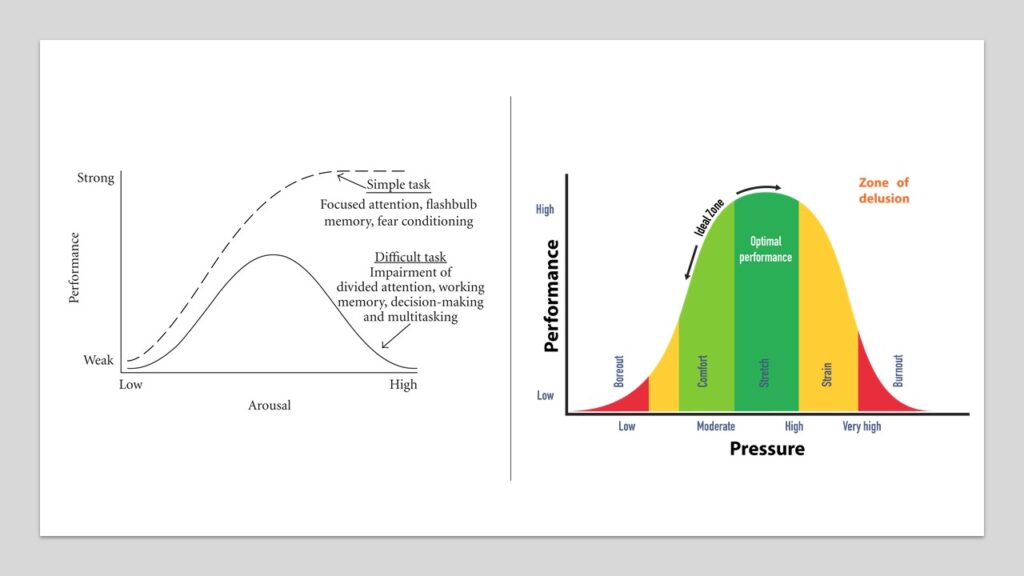
So, again, we are pointing to towards a similar theme- try doing what you love! Then you will try learning topics that you love learning about. And this will keep you happy. And when you are happy with what you are learning, you will want to learn more and you will get most out of your learning journey.
Embrace The Magic of AVEC
Previously, in a series on blogs, I tried establishing the argument that human evolution is progressive and is driven by quality relationships made by any person. Natural mechanisms incentivize people who can make wide and deep high quality connections- incentives being success and happiness. A person who can make such kind of connections are loved by everyone around and they tend to be loyal to him/her. Such a person is a destined for runaway success in both personal and professional world.
If you observe such successful people closely and study their attributes you will eventually find that their success is not attributed to their qualifications or intelligence. They just attract lot of qualified and intelligent people, and make powerful teams. They are able to play the role a conductor who guides talented musicians to deliver a beautiful symphony. These leaders command a sense of brotherhood and loyalty not because of their position- but because their interactions with everyone around them have following qualities (AVEC):
- (A) They give genuine attention: They have the habit of turning towards the other person, literally and figuratively, and listening deeply without judgment, distraction, or the desire to respond.
- (V) They don’t fear to be vulnerable: They don’t attempt to fake. They are always authentic, irrespective of situation. They are not afraid of acknowledging the role they might have played in a situation or the assumptions they might have made, even if they are not proud of the outcomes. They don’t mind sharing honestly how the actions of others might have impacted them. Vulnerability is a rare attribute, and can be found in leaders who are truly exemplary.
- (E) They are genuinely empathetic: They genuinely understand and identify with the emotions and perspectives of others, based on what others share with them.
- (C) They are genuinely compassionate: They always end up demonstrating concern with an intent to be helpful. They love checking in with individuals to see how they are doing, and investing the time to respond in a meaningful way.
AVEC is magical. It is the secret sauce all successful leaders are gifted with. AVEC attracts loyalty and camaraderie. If you think about it- it actually makes sense. To imbibe AVEC as qualities in you, you first need to be ruthlessly honest, ethical and hard working. To embrace AVEC, you must be passionately in love with what you do. Why would you select and trust anyone as a leader if that person is dishonest or does not love what he/she does? Inspiring generals in an army are not the strongest and most ferocious- they are just honest and genuinely love the soldiers under their command.
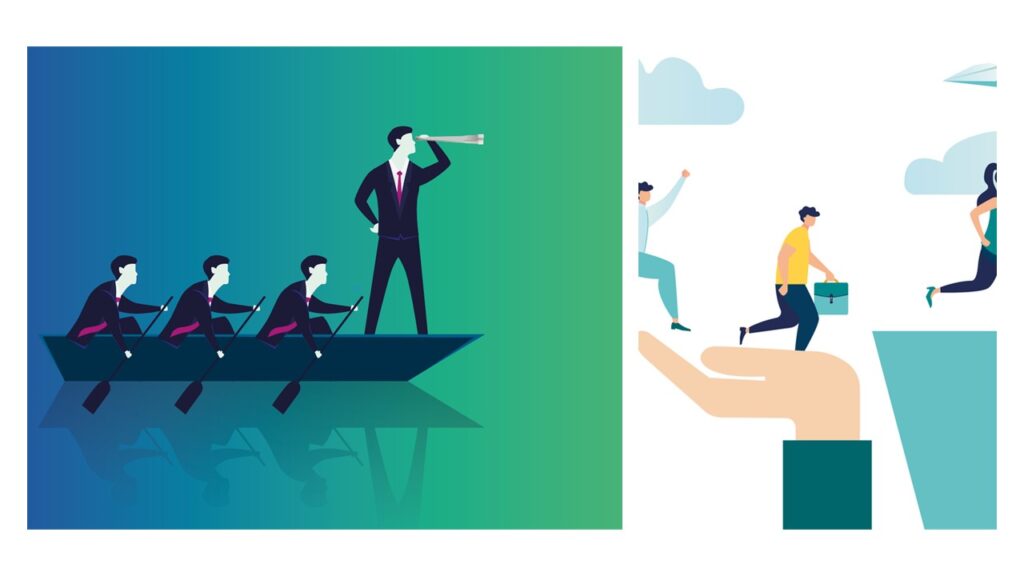
Anyone can easily become a successful employee and a great manager. But very few can truly become a leader.
The day when you start dreaming about success for people working with you, it will be the start of your journey towards true leadership.
In Summary
Excellence at workplace and professional success depends a lot on your luck. But if you know what you love doing and have started attempting to steer your job towards that direction, you are definitely on your way towards success. Love is the main foundation. Rest everything comes automatically. If you are doing what you love, most probably you have discovered your IKIGAI. It allows you to be genuinely excited to experiment new things and keep learning. Eventually, your honesty, hard work and positive energy will evolve you to encompass AVEC and help you grow as a leader. This entire journey can be delayed if you stuck by your biases. Hence, one must always seek guidance of a mentor to broaden one’s vision and be aware of your blind- spots.
I must confess here- I do know what I love doing, but I haven’t yet reached my IKIGAI. I genuinely thank my mentors for their constant guidance that serve as a lighthouse for me in this journey where sometimes everything around can be really dark!




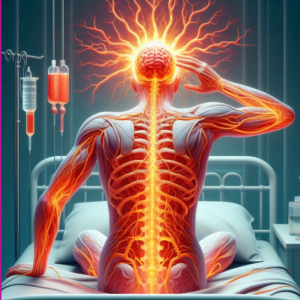

Greetings! Very useful advice in this particular post! Its the little changes that will make the most significant changes. Thanks for sharing!
I am sorry, that has interfered… At me a similar situation. Write here or in PM.
Rather the helpful information
You are absolutely right. In it something is also to me this idea is pleasant, I completely with you agree.
This is the right blog for anyone who wants to find out about this topic. You realize so much its almost hard to argue with you (not that I actually would want…HaHa). You definitely put a new spin on a topic thats been written about for years. Great stuff, just great!
I am really happy that you enjoyed reading my post!
I’m truly enjoying the design and layout of your blog. It’s a very easy on the eyes which makes it much more enjoyable for me to come here and visit more often. Did you hire out a developer to create your theme? Outstanding work!
Thank you- I am really glad that you liked reading this post!
I did not hire any developer- all watching youtube and learning!
Reading your article helped me a lot and I agree with you. But I still have some doubts, can you clarify for me? I’ll keep an eye out for your answers.
Thanks for sharing. I read many of your blog posts, cool, your blog is very good.
Thank you very much for sharing, I learned a lot from your article. Very cool. Thanks. nimabi
Hello my family member! I wish to say that this article is amazing, nice written and include approximately all important infos. I’d like to see more posts like this.
Excellent write-up